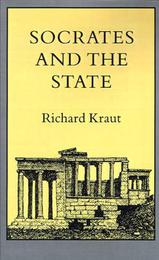
|
Socrates and the State
Paperback / softback
Main Details
| Title |
Socrates and the State
|
| Authors and Contributors |
By (author) Richard Kraut
|
| Physical Properties |
| Format:Paperback / softback | | Pages:350 | | Dimensions(mm): Height 216,Width 140 |
|
| ISBN/Barcode |
9780691022413
|
| Classifications | Dewey:320.101 |
|---|
| Audience | | Professional & Vocational | | Tertiary Education (US: College) | |
|---|
|
Publishing Details |
| Publisher |
Princeton University Press
|
| Imprint |
Princeton University Press
|
| Publication Date |
21 July 1987 |
| Publication Country |
United States
|
Description
This fresh outlook on Socrates' political philosophy in Plato's early dialogues argues that it is both more subtle and less authoritarian than has been supposed. Focusing on the Crito, Richard Kraut shows that Plato explains Socrates' refusal to escape from jail and his acceptance of the death penalty as arising not from philosophy that requires blind obedience to every legal command but from a highly balanced compromise between the state and the citizen. In addition, Professor Kraut contends that our contemporary notions of civil disobedience and generalization arguments are not present in this dialogue.
Author Biography
Richard Kraut, Charles and Emma Morrison Professor in the Humanities at Northwestern University, is author of Aristotle on the Human Good (Princeton).
Reviews"Richard Kraut's important and impressive book is the best available discussion of the Crito and of Socrates' political views and, in several ways, the best available book on Socrates."--T. H. Irwin, Ethics "[Kraut reads] ... The text soberly, with close attention to what it says, reasoning out its import within its own linguistic and historical framework."--Gregory Vlastos, Times Literary Supplement "Richard Kraut's challenging and excellent book approaches Plato's early dialogues and the Crito chief among them 'as chapters from [Socrates'] intellectual biography.' Informing these chapters, in Kraut's view, is a coherent Socratic political theory which gives subtle and surprisingly comprehensive replies to two questions: When is an individual morally bound to obey the state? And who should rule the state?"--James Dybikowski, The Philosophical Review "This is a valuable addition to the literature on the Crito and on Plato's political thought generally. It is to be commended alike from the scholarly and from the philosophical standpoint, and is, incidentally, a beautiful piece of book-production."--C. C. W. Taylor, The Classical Review
|